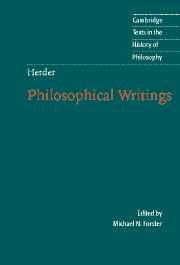Book contents
- Frontmatter
- Contents
- Introduction
- Chronology
- Further reading
- Note on the texts and translation
- Part I General Philosophical Program
- Part II Philosophy of Language
- Part III Philosophy of Mind
- On Thomas Abbt's Writings (1768) [selections concerning psychology]
- On Cognition and Sensation, the Two Main Forces of the Human Soul (1775) [preface]
- On the Cognition and Sensation of the Human Soul (1778)
- Part IV Philosophy of History
- Part V Political Philosophy
- Index
- Cambridge texts in the history of philosophy
On the Cognition and Sensation of the Human Soul (1778)
Published online by Cambridge University Press: 05 June 2012
- Frontmatter
- Contents
- Introduction
- Chronology
- Further reading
- Note on the texts and translation
- Part I General Philosophical Program
- Part II Philosophy of Language
- Part III Philosophy of Mind
- On Thomas Abbt's Writings (1768) [selections concerning psychology]
- On Cognition and Sensation, the Two Main Forces of the Human Soul (1775) [preface]
- On the Cognition and Sensation of the Human Soul (1778)
- Part IV Philosophy of History
- Part V Political Philosophy
- Index
- Cambridge texts in the history of philosophy
Summary
Observations and dreams
To pneuma hopou thelei pnei kai tên phônên autou akoueis, all' ouk oidas pothen erchetai kai pou hupagei.
First essay On cognition and sensation in their human origin and the laws of their efficacy
In everything that we call dead nature we know no inner condition. We daily express the words mass, impact, fall, motion, rest, force, even force of inertia, and who knows what they mean within the thing itself?
But the more we thoughtfully observe the great drama of effective forces in nature, the less we can avoid everywhere feeling similarity with ourselves, enlivening everything with our sensation. We speak of efficacy and rest, of own or received, of remaining or communicating, dead or living, force, completely from the case of our souls. Mass seems to us a yearning for the mid-point, for the goal and place of rest; inertia the little partial rest on a thing's own mid-point through its connection with itself; motion a foreign drive, a communicated and onwardly effective striving which overcomes rest, disturbs the rest of foreign things, until it finds its own rest again. What a wonderful phenomenon elasticity is – already a sort of automaton, which can indeed not give itself motion, but can restore motion to itself; the first apparent spark towards activity in noble natures.
- Type
- Chapter
- Information
- Herder: Philosophical Writings , pp. 187 - 244Publisher: Cambridge University PressPrint publication year: 2002
- 11
- Cited by

